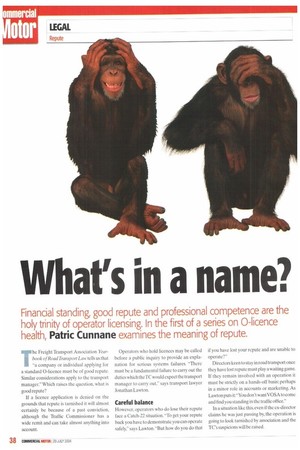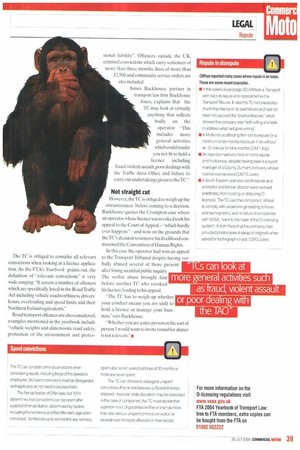What's in a name?
Page 38

Page 39

If you've noticed an error in this article please click here to report it so we can fix it.
Financial standing, good repute and professional competence are the holy trinity of operator licensing. In the first of a series on 0-licence
health, Patric Cunnane examines the meaning of repute.
The Freight Transport Association Yearbook of Road Transport Law tells us that "a company or individual applying for a standard 0-licence must be of good repute. Similar considerations apply to the transport manager," Which raises the question, what is good repute?
If a licence application is denied on the grounds that repute is tarnished it will almost certainly be because of a past conviction, although the Traffic Commissioner has a wide remit and can take almost anything into account. Operators who hold licences may be called before a public inquiry to provide an explanation for serious systems failures. -There must be a fundamental failure to carry out the duties which theTC would expect the transport manager to carry out," says transport lawyer Jonathan Lawton.
Careful balance However, operators who do lose their repute face a Catch-22 situation. "To get your repute back you have to demonstrate you can operate safely," says Lawton. "But how do you do that if you have lost your repute and are unable to operate?"
Directors keen to stay in road transport once they have lost repute must play a waiting game. If they remain involved with an operation it must be strictly on a hands-off basis: perhaps in a minor role in accounts or marketing. As Lawton puts it:-You don't want VOSA to come and find you standing in the traffic office."
In a situation like this, even if the ex-director claims he was just passing by, the operation is going to look tarnished by association and the TC's suspicions will be raised. The TC is obliged to consider all relevant convictions when looking at a licence application. As the FTA's Yearbook points out, the definition of -relevant convictions" is very wide ranging: "It covers a number of offences which arc specifically listed in the Road Traffic Act including vehicle roadworthiness, drivers' hours, overloading and speed limits and their Northern Ireland equivalents."
Road transport offences are also considered; examples mentioned in the yearbook include "vehicle weights and dimensions, road safety, protection of the environment and profes sional liability". Offences outside the UK, criminal convictions which carry sentences of more than three months, fines of more than £2,500 and community service orders are also included.
James Backhouse, partner in transport law firm Backhouse Jones, explains that the TC may look at virtually anything that reflects badly on the operator: "This includes more general activities which could render you not fit to hold a licence including fraud, violent assault, poor dealings with the Traffic Area Office and failure to carry out undertakings given to the TC."
Not straight cut
However, the TC is obliged to weigh up the circumstances before coming to a decision. Back house quotes the Crompton case where an operator whose licence was revoked took his appeal to the Court of Appeal — "which hardly ever happens" — and won on the grounds that the TC's decision to remove his livelihood contravened the Convention of Human Rights.
In this case the operator had won an appeal to the Transport Tribunal despite having verbally abused several of those present after losing an initial public inquiry. The verbal abuse brought him before another TC who revoked his licence, leading to his appeal.
"The TC has to weigh up whether your conduct means you are unfit to hold a licence or manage your business," says Backhouse.
"Whether you are a nice person or the sort of person I would want to invite round for dinner is not relevant 'u


















































































































































































